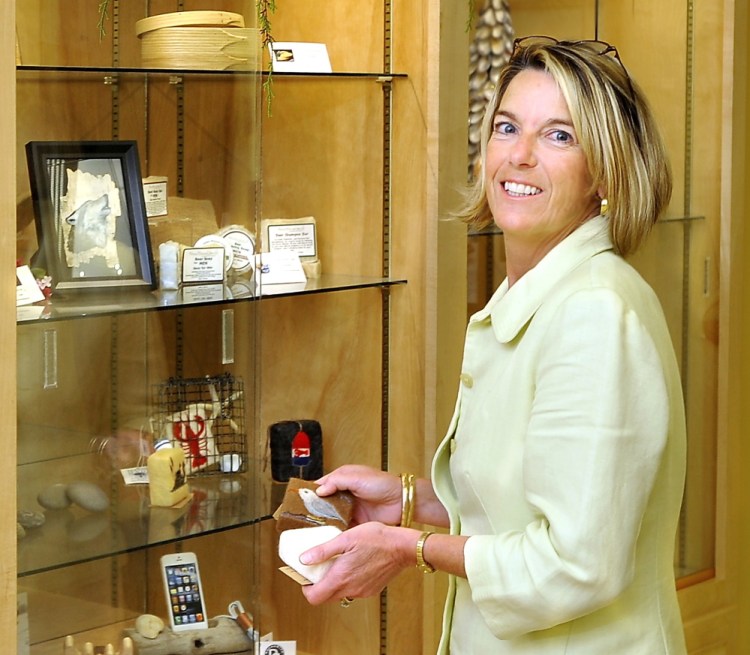Maine entrepreneurs who earn the right to use the state’s “Maine Made” label get lots of help spreading the word about their barbecue sauce, bar of soap or dog biscuits.
Who helps decide whether they’re in or out? Tammy Knight oversees the state’s 30-year-old Maine Products Marketing Program. The program, in the Department of Economic and Community Development, just announced its 1,900th member on Facebook: Arrowhead Clothing Co. in Yarmouth, which makes clothing from sustainable fabrics such as organic cotton, wool and hemp.
“They say necessity is the mother of invention,” Knight said. “Looking at some of our products, that couldn’t be more apparent. Maine people are just inventive and resourceful by nature.”
WHAT’S HOT? Trends come and go, but right now people who spin and dye yarn made from the wool of alpacas or sheep are flooding Knight’s office with applications. “The fiber industry has really, really taken off big time,” she said. “They’re exporting these real high-quality yarns all over the place.”
WHAT IT TAKES TO JOIN: The program doesn’t accept any old Adirondack chair made in someone’s rickety old barn in their spare time. Artisans fill out an online application. Knight’s office does a quick review, then a committee delves further. There is no fee, but applicants must be able to prove their seaglass jewelry business isn’t just a hobby, that they are capable of filling orders.
“Typically, we like to see someone who has been in business for three years, has shown appreciable growth in their business and has an e-commerce site,” Knight said.
Occasionally, a start-up will apply whose business plan is so stellar they are accepted immediately, even without a long track record. Example: Tidal Roots in Eliot, which transforms old barn boards into stand-up paddleboards. “It just seemed like a natural fit,” Knight said. “Of course we want them in the program.”
‘MAINE MADE’ DEFINED: Not everything in a product must be from Maine for it to carry the label. Maine Made wines may contain grapes from California, jam may contain berries from another New England state, and local craft beers use grains grown elsewhere. It’s a practical matter, Knight explains, because Maine entrepreneurs are an inventive bunch and not everything they need is available here. For example, Maine farmers don’t (yet) grow enough barley and hops to meet brewers’ demand.
Artisans are asked on their applications how much they source raw materials in Maine – “not at all,” “partially” or “entirely”; their answers are assigned numerical values. (To even be considered for the Maine Made program, the products must hit a certain score on that question.) The artisans also must detail labor, distribution, handling, design and development practices, some 25 questions in all.
MEMBER PERKS: Maine Made businesses get a profile on mainemade.com, a website containing a dizzying array of products sorted into searchable categories, such as gourmet specialty foods, home furnishings, pet products and even boats. New members are announced on the program’s Facebook page and in a monthly newsletter with 1,700 subscribers. They get access to the Maine Made logo on stickers, printed materials and banners. And they may be chosen to participate in the New England Made Giftware and Specialty Food Shows held in spring and fall. Gourmet specialty foods may ultimately make it to the big time: the Fancy Food shows in San Francisco.
HOOK-UPS: Maine Made sometimes plays matchmaker, helping members find the right relationship for partnering. When Four Winds Farm in Gorham needed a source of goat’s milk soap for their felted soaps – “soap in its own washcloth” – Knight introduced them to Spirit Wind Farm in Lebanon. Maine Coast Creations in Cutler, which makes products out of crushed lobster, clam and mussel shells, is laser engraving artwork from a Maine Made business called “Lobstering is an Art” onto beer glasses.
NEW MEMBER WITH A GOOD STORY: Good To-Go, a food business run by a husband-and wife team in Kittery. “They moved here from out of state,” Knight said. “One was a gourmet chef – loved cooking, loved food. The other one was very outdoorsy. So they combined both of their passions, being able to be outdoors but have good food while they’re outdoors. They create dehydrated gourmet meals that you can take hiking, kayaking, sailing.”
PRODUCTS THAT GIVE HER THAT SLAP-ON-THE-FOREHEAD V-8 MOMENT: “That happens every day,” Knight said. “These applications come in and you go, ‘Oh my gosh, why didn’t I think of that?’ Buoy bats (The founder of the business) and his daughter are on the beach and they find an old lobster buoy and they put a stick in it, and they start playing baseball with it, and the next thing you know buoy bats are all over the place.”
MORE THAN LOBSTERS AND LIGHTHOUSES: “I got a phone call from a pretty high-end online catalog retailer from the West Coast last Friday looking for Maine-made croquet sets,” Knight said. “I queried our database and couldn’t find that we had any vendors that did that, but thought ‘You know what? I’ll bet you somebody in Maine does.’ So I put a query out on our Facebook page, and within seven minutes I had all these responses.”
Send questions/comments to the editors.




Comments are no longer available on this story